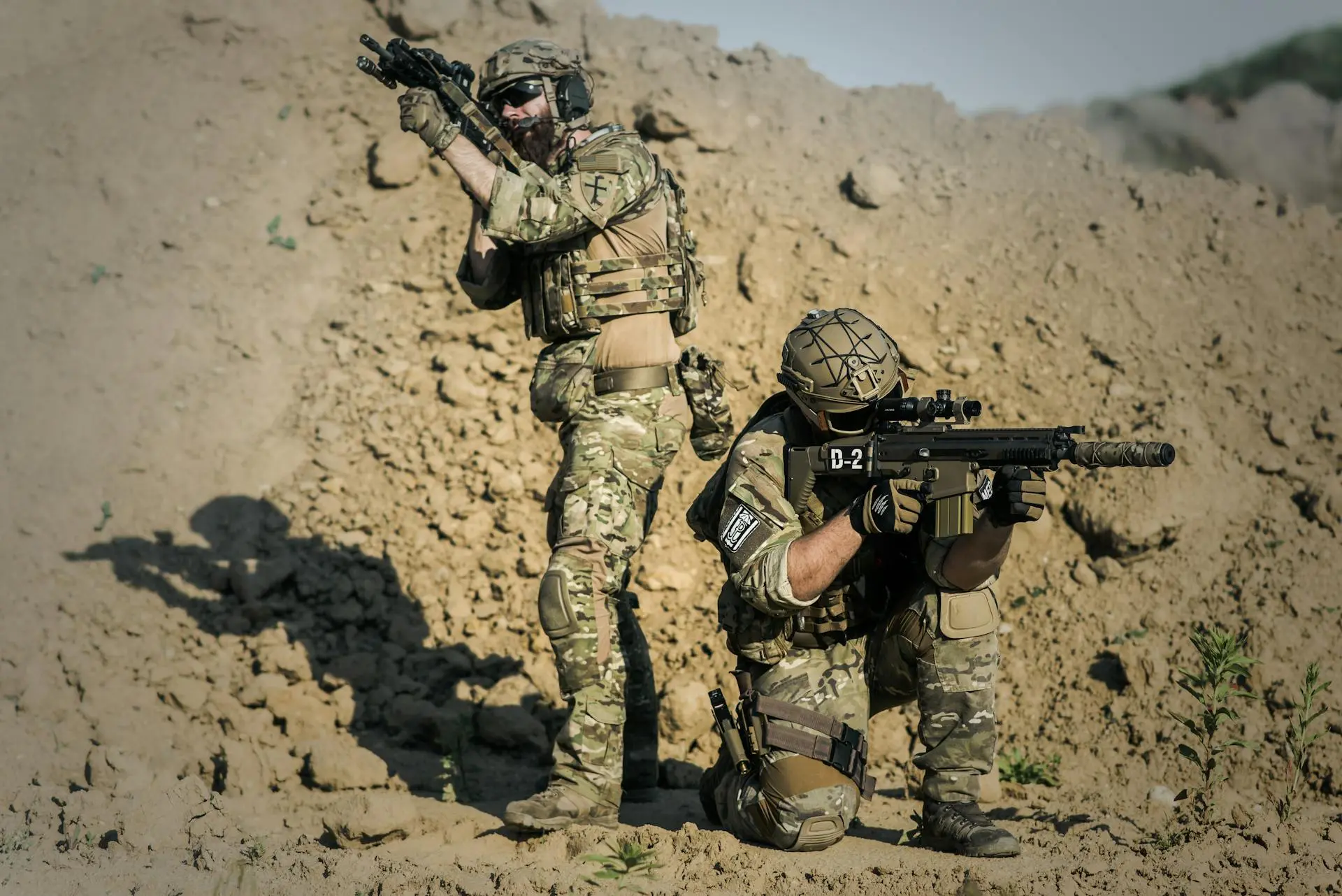Britain is sleepwalking into war — it’s time to wake up

Dr Linda Parker
- Published
- Opinion & Analysis

As war returns to Europe and global tensions rise, Britain must confront hard questions about its ability to defend itself. Years of underfunding, recruitment failure and cultural complacency have left the Armed Forces dangerously hollow. Drawing on a century of military history, Dr Linda Parker warns that the UK is once again repeating the same costly mistake: assuming peace will last and someone else will do the fighting
When Britain declared war on Nazi Germany in September 1939, we entered the conflict from a position of alarming weakness. Years of underfunding, diplomatic wishful thinking, and the widespread belief that peace would hold had left our armed forces hollowed out and underprepared. We had the will to fight but not the means, and it took years to rebuild our strength. In the meantime, we lost ground, lives and allies.
Britain may have won the Second World War, but we did not win it quickly — and we did not win it alone.
Eighty-five years later, we are making the same fatal assumptions.
The world is becoming more dangerous by the month. Russia has invaded Ukraine and openly threatened NATO. Iran is destabilising the Middle East. China is testing the West’s resolve in the Pacific. The United States — our closest military ally — is increasingly looking inward. If Britain is called to act alone, or as part of a limited NATO response, we may find ourselves not just overstretched but fundamentally incapable.
Our armed forces remain, in the words of Parliament’s own Defence Committee, “consistently overstretched”. Recruitment is in crisis. Equipment stockpiles are depleted. Personnel deployed on constant readiness rotations are left with no time for full warfighting training. These are not fringe concerns. They are being flagged by military leadership and detailed in official reports. Still, the drift continues.
The government has pledged to raise defence spending to 2.6% of GDP by 2027. That commitment followed a £2.5 billion cut in 2024 — made during what the Ministry of Defence itself has described as a “pre-war world”. The proposed increase will take years to arrive. So did rearmament in the 1930s. And it came too late.
In my own academic work, I’ve spent decades studying the consequences of strategic delay. In the wake of the First World War, Britain convinced itself there would not be another. The military was dismantled, regiments disbanded, and budgets slashed. The so-called “Ten Year Rule” — a working assumption that no major conflict was likely within the next decade — became embedded policy. Between 1919 and 1932, the defence budget fell from £766 million to just £102 million. When the international situation deteriorated, Britain scrambled to rearm. It wasn’t enough. The cost was years of lost initiative and avoidable sacrifice.
The cycle repeated later in the century. After the Cold War, the “peace dividend” justified another round of cuts. It left Britain underpowered during the First Gulf War. In 1982, had the scheduled defence cuts already taken effect, we might not have been able to retake the Falklands.
Now, once again, the numbers are stark. The regular Army has fallen below 73,000 — the smallest since the 18th century. Recruitment times stretch up to 376 days. Ammunition and missile stocks are running low. NATO commitments are straining logistics, personnel and morale.
This crisis runs deeper than spreadsheets. A cultural shift is underway — and the parallels with the interwar years are striking.
A YouGov poll for The Times in February 2025 found that only 11% of Gen Z Britons — those aged 18 to 27 — would be willing to risk their lives for their country. Two-fifths said they would never fight. Only 42% said they were proud to be British. (Former Tank Commander and author Matthew Baldwin talks more about UK conscription in his excellent piece for The European here.)
This is not the first time young people have turned away from military service. In 1933, the Oxford Union passed the motion: “This House would not fight for King and Country.” Similar sentiments were voiced at Cambridge. Pacifist movements flourished. War seemed both abhorrent and unlikely. Then it came — and many of those young men were among the first to enlist.
That instinct to serve still exists. But it cannot be presumed. Nor will it emerge in a vacuum. One Gen Z respondent in the poll said: “With the way politics looks at the moment, I don’t have a lot of faith in our politicians… so I think I’d be unlikely to feel really convinced to fight for them or for the country.” That is not a fringe opinion. It is a rational reaction to a system that often feels remote, inconsistent, or dishonest.
Over the past decade, I’ve spoken to military professionals across the UK, Europe, and the United States. Their concerns are consistent: declining morale, outdated recruitment methods, and short-term political thinking that makes long-term planning impossible. The Armed Forces are not just struggling to attract new recruits. They are struggling to explain the value of military service in modern Britain.
Demographic changes are compounding the problem. The traditional recruiting base has shrunk. Ethnic minorities and women remain underrepresented. A tight labour market draws younger people elsewhere. Recruitment delays — some lasting nearly a year — deter those who might otherwise apply. For many, the process is too slow, too bureaucratic, and too unclear.
There is still time to act. But it requires more than promises and slogans. It requires leadership — political, military and civic — that speaks honestly about risk and responsibility. It requires a cultural reset: one that re-establishes national defence as a shared duty. It requires policy that matches rhetoric with real commitment.
Britain’s history is full of warnings. They have been written in letters home from the trenches, in the minutes of forgotten Whitehall committees, in the names on too many war memorials.
We ignored them before. We are ignoring them now.
And this time, there may be no one left to wake us.

Dr. Linda Parker is widely considered to be one of Britain’s leading polar and military historians. She is the author of six acclaimed books, an in-demand public speaker, the co-founder of the British Modern Military History Society, and the editor of Front Line Naval Chaplains’ magazine, Pennant, which examines naval chaplaincy’s historical and contemporary role.
Main image: Courtesy Pixabay
RECENT ARTICLES
-
 The era of easy markets is ending — here are the risks investors can no longer ignore
The era of easy markets is ending — here are the risks investors can no longer ignore -
 Is testosterone the new performance hack for executives?
Is testosterone the new performance hack for executives? -
 Can we regulate reality? AI, sovereignty and the battle over what counts as real
Can we regulate reality? AI, sovereignty and the battle over what counts as real -
 NATO gears up for conflict as transatlantic strains grow
NATO gears up for conflict as transatlantic strains grow -
 Facial recognition is leaving the US border — and we should be concerned
Facial recognition is leaving the US border — and we should be concerned -
 Wheelchair design is stuck in the past — and disabled people are paying the price
Wheelchair design is stuck in the past — and disabled people are paying the price -
 Why Europe still needs America
Why Europe still needs America -
 Why Europe’s finance apps must start borrowing from each other’s playbooks
Why Europe’s finance apps must start borrowing from each other’s playbooks -
 Why universities must set clear rules for AI use before trust in academia erodes
Why universities must set clear rules for AI use before trust in academia erodes -
 The lucky leader: six lessons on why fortune favours some and fails others
The lucky leader: six lessons on why fortune favours some and fails others -
 Reckon AI has cracked thinking? Think again
Reckon AI has cracked thinking? Think again -
 The new 10 year National Cancer Plan: fewer measures, more heart?
The new 10 year National Cancer Plan: fewer measures, more heart? -
 The Reese Witherspoon effect: how celebrity book clubs are rewriting the rules of publishing
The Reese Witherspoon effect: how celebrity book clubs are rewriting the rules of publishing -
 The legality of tax planning in an age of moral outrage
The legality of tax planning in an age of moral outrage -
 The limits of good intentions in public policy
The limits of good intentions in public policy -
 Are favouritism and fear holding back Germany’s rearmament?
Are favouritism and fear holding back Germany’s rearmament? -
 What bestseller lists really tell us — and why they shouldn’t be the only measure of a book’s worth
What bestseller lists really tell us — and why they shouldn’t be the only measure of a book’s worth -
 Why mere survival is no longer enough for children with brain tumours
Why mere survival is no longer enough for children with brain tumours -
 What Germany’s Energiewende teaches Europe about power, risk and reality
What Germany’s Energiewende teaches Europe about power, risk and reality -
 What the Monroe Doctrine actually said — and why Trump is invoking it now
What the Monroe Doctrine actually said — and why Trump is invoking it now -
 Love with responsibility: rethinking supply chains this Valentine’s Day
Love with responsibility: rethinking supply chains this Valentine’s Day -
 Why the India–EU trade deal matters far beyond diplomacy
Why the India–EU trade deal matters far beyond diplomacy -
 Why the countryside is far safer than we think - and why apex predators belong in it
Why the countryside is far safer than we think - and why apex predators belong in it -
 What if he falls?
What if he falls? -
 Trump reminds Davos that talk still runs the world
Trump reminds Davos that talk still runs the world


























